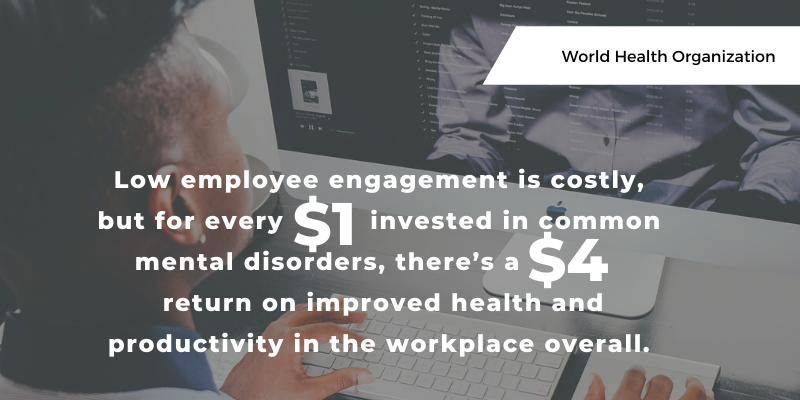Working Remotely? 4 Smart Ways to Stay Connected
Working Remotely? 4 Smart Ways to Stay Connected Here we are two months into the pandemic. If you’re working remotely, it’s time to ask, “How well...

It’s no secret. As a country, our workforce is stressed.
In 2016, the CDC reported 71% of adults reported at least one symptom of stress, such as a headache or feeling overwhelmed or anxious.
The engagement of your employees can be significantly impacted by their mental health, as well as your own. But are Christian organizations doing enough to help combat this issue of employee well-being?
For the sake of clarity, mental health in this instance is referred to as the ability for an individual to do one’s job effectively, without being depressed, anxious, or angry, among other emotions, and being able to effectively manage one’s emotions so that they are not debilitated by them.
Poor mental health can impact employees in terms of
Mental health conditions and unhealthy work environments, in general, can get in the way of good work, decrease productivity and output, and hinder your ministry’s impact overall.
For some organizations, especially those that have employees who are regularly engaged in trauma heavy environments, the need for employer initiated mental health resources is even more crucial. In these situations, employees need an outlet to talk about what they are experiencing on a day to day basis.
According to SHRM, 27% of US employees would like for their employer to provide additional support for mental health, including coping with burnout. Your employees may be crying out for help, but no one is listening.

In short, yes. We can do better.
Research shows leaders cannot afford to avoid addressing the mental health of both our teams and ourselves. Low employee engagement is costly, but for every $1 invested in common mental disorders, there’s a $4 return on improved health and productivity in the workplace overall.
When addressing the mental health needs of your team, be sensitive to their experience. Leaders can be unaware of the needs of their teams because their jobs are so different. For example, in the case of someone working in a rescue mission or foster care agency, his/her day to day interactions with clients have an emotional impact that leadership may not be able to empathize with or relate to. As a leader, look for opportunities to see and hear the needs of your lowest level staff all the way to the top.
When addressing mental health concerns within your executive team (or yourself) be careful of “overly spiritualizing” leadership. Within the nonprofit space, there is often a degree of “sacredness” surrounding leaders, or the idea that because the leader is a “spiritual leader” he/she is not subject to the same standards or protocols for acceptable behavior.
As a result, fear of calling leaders out on poor behavior becomes the norm and the behaviors continue. But those same people who are afraid to speak up are talking about the issue behind the leaders back, convinced that nothing could ever change.
So often we hear from individuals in workplaces with leaders who are struggling with mental health say, “well that’s just how it is.” This is unacceptable.
Here are a few ways you can create a circle of accountability when it comes to addressing your mental health, or the mental health of your executive team as a whole. These suggestions can be implemented as systems within your executive team to help keep everyone accountable for their actions.
Leaders often struggle with mental health because of a lack of feedback and follow-up action plans to improve behaviors. The best way to improve and move toward healthy behavior is to listen to those around you and work diligently toward changing.
You need a group of people around you who can call you out when you may be operating in an unhealthy way. This group of individuals can challenge you in your leadership and professional growth, help you identify areas of growth, and keep you on track in terms of your emotional health.
God has entrusted you with the opportunity to lead. With this in mind, your choices and ideas are not divine. A healthy leader knows what he has been entrusted with and stewards that well, rather than take advantage of it in the name of “spirituality.”
The first step toward healing is an acknowledgment that you have contributed to a problem, but are choosing to stop. In this process of acknowledgment, you must confront the conflict. Don’t be passive-aggressive or beat around the bush. With faith-filled assertiveness, tell the truth. God will honor your honesty.
Sometimes leaders will avoid getting the help they need out of a concern that they “need to be strong” or a sense of shame. Instead, leaders can set the example by being vulnerable and transparent and asking for help and guidance when they need it themselves.
Mental health can be a sensitive issue, but as leaders, we cannot afford to avoid the hard topics. The overall health of your organization and the individuals who make up your culture rely on you to provide a safe and stable place for them to be productive and engaged. And remember, that means you too!


Working Remotely? 4 Smart Ways to Stay Connected Here we are two months into the pandemic. If you’re working remotely, it’s time to ask, “How well...

Six Steps for Building Trust with Employees In a recent BCWI survey just over half of the respondents identified building trust with employees as one...

The Role of Trust in Any Organization: The Superpower Your Team is Missing Everybody loves the story of a superhero. The best superheroes are strong...